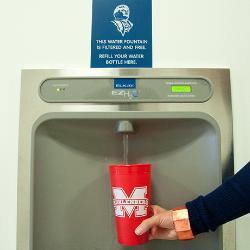Muhlenberg College featured in "The Princeton Review's Guide to 353 Green Colleges: 2015 Edition"
 Muhlenberg is one of the most environmentally responsible colleges, according to The Princeton Review's 2015 edition of its free book.
Muhlenberg is one of the most environmentally responsible colleges, according to The Princeton Review's 2015 edition of its free book.
Friday, April 17, 2015 09:28 AM
The College has also been recognized in The Princeton Review's Colleges that Pay You Back, as well as on their The Best 379 Colleges and Best Northeastern lists.
Published April 16, a few days before the April 22, 2015 celebration of Earth Day, the free, 218-page Guide to Green Colleges can be downloaded at www.princetonreview.com/green-guide.
The Princeton Review chose the schools for this sixth annual edition of its "green guide" based on data from the company's 2014 survey of hundreds of four-year colleges. The survey has a specific focus on schools' commitments to the environment and sustainability.
"Being green" is important at Muhlenberg. At the center of the College’s greening efforts is its academic program in sustainability studies, where students from a variety of disciplinary backgrounds come together to explore innovative ways to solve environmental problems. Included in the program are numerous experiential opportunities both locally and abroad in Bangladesh, China and Costa Rica. Outside of the classroom, students and faculty work directly with plant operations staff, the office of campus sustainability and dining services and are directly involved in day-to-day campus greening efforts, such as conducting energy audits on campus and constructing a green roof with a monitoring system for assessing its performance.
A number of professors from different departments conduct research on sustainability related issues. This work includes studies of development and water struggles in India, sustainable urban food production, social entrepreneurship, environmental policy and the connection between environmental and social justice issues.
 Pictured: One of Muhlenberg's "Just Tap It" fountains, designed to offer free, filtered water and reduce campus dependence on disposable bottles.
Pictured: One of Muhlenberg's "Just Tap It" fountains, designed to offer free, filtered water and reduce campus dependence on disposable bottles.
"Muhlenberg's achievement in sustainability comes from the collaborative effort and dedication of many students, faculty, staff and administrators," said Dr. Richard Niesenbaum, professor of biology and director of Muhlenberg's sustainability studies program. "Their hard work has resulted in a 'greener' campus. But more importantly, it has allowed us to demonstrate that the goals of sustainability are achievable, and that environmental protection, economic opportunity and social justice are inextricably linked."
In addition to the College's academic programs, student groups have successfully campaigned to reduce commercial bottled water use by supplying students with re-usable bottles and through the installation of water-bottle filling stations throughout campus. The College also offers sustainability living and learning experiences; students have designed and installed a solar hot water system for their own house, have grown their own organic food and have created and maintained a permaculture garden.
The Princeton Review first published the Guide to Green Colleges in 2010. It remains the only free, annually updated downloadable guide to green colleges. The company is also known for its dozens of categories of college rankings in its annual books, The Best 379 Colleges and Colleges That Pay You Back.
Founded in 1848, Muhlenberg is a highly selective, private, four-year college located in the Lehigh Valley of eastern Pennsylvania, affiliated with the Evangelical Lutheran Church of America. Muhlenberg offers programs in the liberal arts and sciences, along with selected pre-professional studies and a number of interdisciplinary majors.
